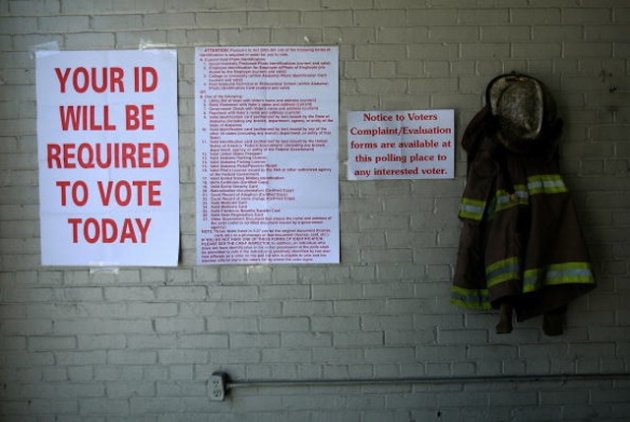 Voting signs are posted for the election in a firehouse Nov. 4, 2008 in Selma, Ala. (Mario Tama/Getty Images)
Voting signs are posted for the election in a firehouse Nov. 4, 2008 in Selma, Ala. (Mario Tama/Getty Images)
On Wednesday, the Supreme Court hears arguments over whether a key part of the Voting Rights Act?a cornerstone of the civil rights movement?is unfairly targeting southern states for systematic racial bias that no longer exists.
The court's decision on the law, which helped dismantle decades of discriminatory voting restrictions in the South, could hand a victory to the recent conservative-led movement to tighten identification requirements and limit early voting hours at the ballot box. A wave of such laws swept 30 states over the last few years.
Supporters say these laws were designed to combat voter fraud. But they have attracted lawsuits from civil rights groups and the federal government, who argue that the laws disenfranchise minority citizens, who are less likely than white voters to have photo ID. (The Brennan Center estimates that about 11 percent of voting age citizens do not have a government issued photo ID.) The laws also sparked a political argument, with some Democrats accusing Republicans of pushing voter ID laws because they affected constituencies that tended to vote Democrat.
Some of these state photo ID laws in the South have been aggressively fended off by the Justice Department, which argued that states covered by the 1965 Voting Rights Act cannot change election law in this way because it disadvantages minority voters. Section 5 of the Voting Rights Act, reauthorized by Congress in 2006, gives the federal government the ability to preemptively reject changes to election law in states and counties that have a history of discriminating against minority voters. The law covers nine states and portions of seven more.
The Justice Department used Section 5 of the law to block voter ID laws in Texas and South Carolina last year, and also struck down early voting restrictions in five counties in Florida. (Minority voters are more likely than white voters to vote early in person.)
Justices in the conservative wing of the Supreme Court, including Chief Justice John Roberts, have expressed reservations that the nine Southern states covered by the law still require the same degree of federal oversight that they did 60 years ago. "Voter turnout and registration rates [between blacks and whites] now approach parity," Roberts wrote in a decision in 2009. "Blatantly discriminatory evasions of federal decrees are rare. And minority candidates hold office at unprecedented levels."
Another argument against Section 5's constitutionality is that it's unclear whether minority voters in Southern states are more likely to face discrimination at the polls than they are in other states. Voter ID laws, for example, have passed in states such as Wisconsin, Pennsylvania and Indiana. Since those states do not have a history of voter discrimination?and are not covered by the act?their voter ID laws did not have to first pass federal inspection. That said, southern states covered under the act were much more likely to pass a voter ID law than other states. Seven of the nine states covered in full under the act adopted such a law, compared to 19 states overall.
If Roberts and at least four other justices decide to strike down the part of the law that singles out the southern states, civil rights advocates will have few places to go in challenging voter ID laws. The Supreme Court upheld Indiana's photo ID law in 2008, suggesting that without Section 5, voter ID laws will prevail in the courts.
Rick Hasen, an expert on voting law at the University of California at Irvine, said it would be "tough" to win a case against a voter ID law without Section 5.
Wendy Weiser of the non-profit Brennan Center, which has challenged some voter ID laws as discriminatory, says Section 5 is a "potent tool" against the laws. "It's a much heavier litigation burden," without Section 5, she said.
secret service scandal shea weber greystone sidney crosby at the drive in alternative minimum tax modeselektor
 Are you the adult, sandwiched between your parent and your young child, respecting the one who raised you and hoping they will respect your choices in raising your own family? I am curious what works (and what doesn?t work). Please comment below and join me as we start a dialogue about the role of grandparents!
Are you the adult, sandwiched between your parent and your young child, respecting the one who raised you and hoping they will respect your choices in raising your own family? I am curious what works (and what doesn?t work). Please comment below and join me as we start a dialogue about the role of grandparents!













